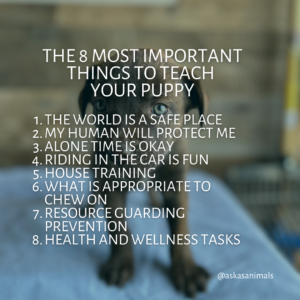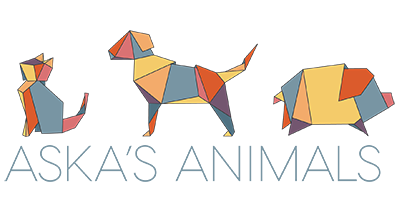What Puppies Really Need To Learn
The 8 Most Important Things to Teach Your Puppy

Puppy parents are eager to teach their new family member skills that will set everyone up for success long term, but ‘sit,’ ‘stay’ and ‘come’ aren’t the most important lessons to focus on. This list of what puppies really need to learn builds a foundation for the confidence and trust puppies need to learn before voice control commands.
The world is a safe place:
Teaching your puppy to socialize safely builds the puppy’s confidence in themself and the puppy’s trust in you. Facilitate enjoyable, worry-free experiences for your puppy by first paying close attention to their physical cues for stress and fear. While playing with another puppy, walking in a busy place or meeting new people at a barbecue, don’t rush, force or coerce your puppy to interact with things they are tentative around. It is your job to protect your pup from well-meaning but overwhelming folks or from too-intense experiences.
My human will protect me:
Dogs protect themselves with fight or flight, so if your puppy does not feel safe, he might bite or run away. To build trust with your dog, you must try to understand, listen to, and respect how your dog feels. This includes preventing your puppy from getting into situations in which the puppy will feel stressed or overwhelmed.
Alone time is okay:
Before you came along, your puppy was likely with their littermates and never experienced alone time. Because dogs are not allowed everywhere, it is important to teach puppies that alone time is okay. Start with crate or confinement training. For more information, read our blog post ‘Confinement Training and Why It’s So Important.’
Riding in the car is fun:
No matter how much time your dog will spend in the car in the future, it is important your puppy learns the car is not a scary place. For many puppies, they are afraid of the car because it makes them feel motion sick and they have associated the car with leaving their littermates or going to the vet. Without force, before even turning the engine on, train your puppy to feel comfortable in the car by creating a safe place with a crate or a dog bed and a high reward delicious treat.
House training:
Teaching a puppy where they are allowed to go to the bathroom is essential for everyone’s health and happiness. Crates, puppy pads, consistency, attention, understanding and patience are keys to house training your new puppy.
What is appropriate to chew on:
Puppies explore the world with their mouths and adult dogs chew to relieve stress so teaching your puppy about what is appropriate to chew on will set everyone up for success in the future. Just like house training, good management is important to teaching this lesson. Provide your puppy enjoyable chew toys and keep the chew toys exciting and interesting by mixing them up throughout the week. For more enrichment ideas, read our blog post ‘Indoor Enrichment Activities.’
Resource guarding prevention:
It is natural for dogs to protect their food, toys and safe place so it is important for puppy owners to teach dogs positive association with humans approaching their food bowl, taking a toy out of their mouth or entering and exiting their safe space. There is no telling which puppies will be guarders. Even if your puppy shows no signs of guarding, an ounce of prevention is worth a pound of cure with resource guarding.
Health and wellness tasks:
Grooming, baths, toenail clipping, ear drops, eye drops and taking medicine are all tasks you can help your puppy get comfortable with when they are young. High reward treats, saying ‘yes!’ and belly rubs are great ways to build positive association with everyday activities.
This is a long list, we know, but once you have helped your puppy grow to be a confident and happy youngster, you will have a foundation for a happy life together.
Questions? Check out our virtual and in-person Behavior Workshops as well as the Resources Page of our website!



